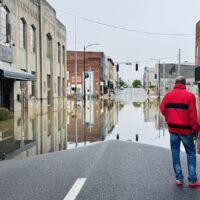On the first night of February, I tossed and turned until dawn worrying about my job. I had just seen a Reddit post warning members of a geography subreddit that the federal government was shutting down data portals in 90 minutes.
My job as a data journalist at the Daily Yonder relies almost exclusively on federal datasets, from my reporting on the coronavirus pandemic that used CDC data, to economic updates on employment from the Bureau of Labor Statistics, just to name a few.
In the comments of the post, several Reddit users recommended archiving data using a project called archive.org, which lets users save old versions of websites. Other commenters shared blogs with links to download archived data, like this post from a Tumblr account called Census Reporter.
According to a New York Times analysis published on February 2, over 80,000 pages had been scrubbed by federal agencies.
The purge came after Trump’s January 29th Executive Order that directed federal agencies to “take down all outward facing media (websites, social media accounts, etc.) that inculcate or promote gender ideology.”
But journalists and researchers found that federal websites purged data related to a host of other topics, including teen health, smoking, obesity, HIV infections, and social vulnerability to climate change, among others.
Most web pages and datasets have since been restored. But Trump’s blatant disdain for freedom of information should concern us all.
Federal judge orders Trump administration to restore deleted webpages
In a hearing on Monday, February 10th, U.S. District Judge John Bates ordered the Trump Administration to restore public health datasets after Doctors for America, a nonprofit advocacy organization, sought a temporary restraining order from the Department of Health and Human Services (DHHS). Doctors for America said they needed federal health data to treat patients and conduct research.
Bates said the DHHS, the Center for Disease Control and Prevention (CDC), and the Food and Drug Administration (FDA) illegally scrubbed public health information from government websites.
One of those restored datasets was the Youth Risk Behavior Survey (YRBS) from the CDC. It’s unclear what, if anything, has changed since the YRBS was reuploaded.
The restored datasets suggest that the Trump Administration is complying with Judge Bates’s order. But notifications on federal websites suggest that the purge isn’t over yet.
Many of the federal datasets now display a banner notification that the website is being modified to comply with President Trump’s Executive Orders. I took the following screenshot from the National Center for Health Statistics website on Thursday, February 13, 2025.
Although the CDC’s Community Profile page, which we relied on for our coronavirus reports, is still available, further restraints on the agency’s ability to communicate with the public about infectious outbreaks will impede news outlets like ours from keeping our readers in the loop.
What else will change as the Trump Administration scours federal material for anything out of alignment with MAGA ideology?
Federal data is important for rural communities
Researchers and journalists use federal datasets to track health, economic, and demographic trends. At the Daily Yonder, federal data helps us highlight geographic inequalities by comparing rural and urban America on a variety of different metrics.
“The deletion of information or just the threat of it should make us uneasy,” said public health professional Candace St. John in an interview with The Hill.
St. John said that federal data is especially important for rural communities that might not have their own health departments. She told The Hill that they “rely on these data sets to make important decisions up and down.”
Rural communities also rely on federal datasets to determine eligibility for certain rural-specific grant programs that require grantees to demonstrate that they are rural enough to participate. The Office of Management and Budget (OMB) dataset on metropolitan counties is a popular source for this use.
Organizations also use federal datasets on environmental vulnerability, economic distress, and poverty rates, among others, to demonstrate a need for funding on grant applications. Erasing information about marginalized populations hinders their ability to express their needs and advocate for themselves.
And because federal agencies created these datasets with taxpayer money, the public is entitled to the wealth of information inside them. Limiting public access to publicly funded information is censorship, something a Slate Magazine reporter referred to as digital book burning.
So far, federal courts seem to be holding President Trump’s purging attempts somewhat in check. Here’s to hoping it stays that way.
This column is republished with permission from The Daily Yonder. Read the original.



